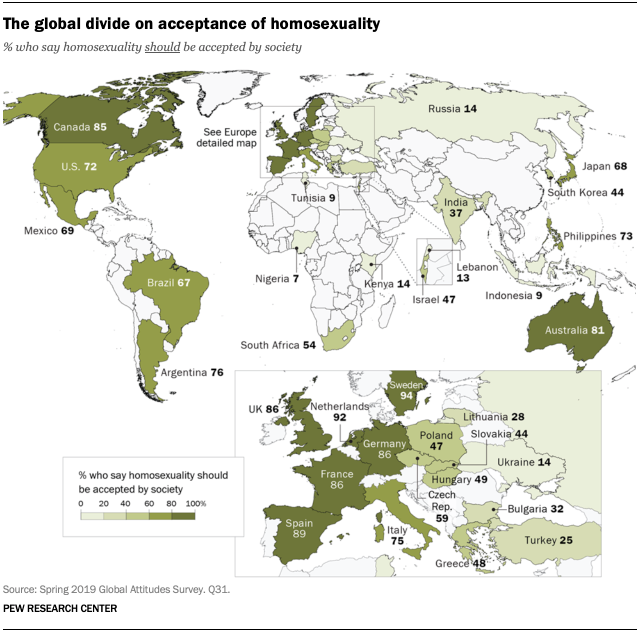While many societies and governments around the world have learned to accept LGBTQ+ communities, many others condemn homosexuality and deem homosexual behavior illegal. And while same-sex marriage and inclusive antidiscrimination laws are in place in some parts of the world, many LGBTQ+ rights are still absent or under attack in many more countries. This year the Pew Research Center released findings from a 2019 survey of 38,426 people in 34 countries, breaking down how populations in different cultures and demographics vary their stances on acceptance of homosexuality.
Overall acceptance of homosexuality in many countries has increased in the last 15 years or so; 72% of Americans say gay lifestyles should be accepted compared to 49% in 2007, and South Africa and South Korea have seen significant hikes in acceptance in the past 20 years. Pew reported that acceptance of gay communities varies by country and region in terms of several key factors including generation, education, income, gender, religious affiliation or lack thereof, political stance and national wealth.
Across the world, Pew found that people who are part of a religious group are generally less accepting of homosexuality than people who are unassociated with a religious group. Atheists, agnostics or those referred to in the report as “religious nones,” typically accept homosexuality more often. Conversely, religious groups, which in Pew’s survey pool tend to be Christian, are less welcoming of gay and lesbian ways of being. One such example is in South Korea, where religious nones are roughly twice as inclined to support the acceptance of homosexuality as Christians and Buddhists.
Of the countries surveyed with large enough Muslim communities to evaluate, very few individuals who practice or adhere to Islam are proponents of homosexuality. Among Christian and Muslim Nigerians, however, acceptance of homosexuality is equally low, running at 6% and 8%, respectively. In Israel, 53% of Jews condone homosexuality in contrast to just 17% of Muslims.
Not surprisingly, those who clock in on the political right tend to be less accepting of homosexuality than those on the political left. To that end, more U.S. Democrats believe that homosexuality should be accepted compared to U.S. Republicans. According to the report, over 80% of Democrats and Democrat-leaning independents support the acceptance of homosexuality, in contrast to 58% of Republicans and Republican-leaning individuals.
Similarly in Europe, followers of right-wing populist parties tend not to favor gay and lesbian lifestyles. On a global scale, people who identify with the ideological left are typically more accepting of homosexuality than those who conform to the ideological right. In South Korea, people who are ideologically left-leaning are more than twice as likely to support homosexuality than those on the right.
A country’s wealth also plays a strong role in determining whether its population accepts homosexuality. The wealthier the country, the more accepting its inhabitants tend to be compared to poorer countries. And in terms of education level, inhabitants of countries with higher rates of education are much more inclined to accept homosexuality than those who aren’t as educated.
Although Pew’s survey indicated no substantial disparity between men’s and women’s stances on homosexuality, in the 12 countries with a noticeable difference, women were more inclined to support homosexuality than men.
Even though the majority of people in 16 out of 34 total surveyed countries say homosexuality should be accepted, vast global divides still exist. The report showed that 94% of people surveyed in Sweden believe in the acceptance of homosexuality, while just 7% of those living in Nigeria share that conviction. Among the countries surveyed, a median of 52% of people said they’re support the acceptance of homosexuality, but 38% said they reject it.
Regionally, the report indicated that communities in Western Europe and North America have the most acceptance of gay and lesbian lifestyles. In Central and Eastern Europe, acceptance of homosexuality remains more of a divisive issue. Fewer percentages of populations in sub-Saharan Africa, the Middle East, Russia and Ukraine support the acceptance of homosexuality. However, South Africa and Israel are the outliers in their regions, where 54% and 47% of surveyees are for pro gay acceptance, respectively.
Those who reside in the Asia-Pacific region are also divided on the issue. About 81% of Australian surveyees and 73% of Filipinos support the acceptance of homosexuality, while 9% of Indonesians feel the same, the report says.
Unfortunately, compared to other countries in Western Europe and North and South America, a greater percentage of people in the U.S. are less accepting of gay lifestyles. While the Supreme Court recently ruled that federal law protects employees based on sexual orientation and gender identity, 27 U.S. states still do not have nondiscrimination laws that include those classifications when it comes to employment, housing and public accommodations, according to FreedomForAllAmericans.org. Nondiscrimination laws also vary by state. In Wisconsin, the laws exclude transgender individuals from nondiscrimination protections. In Utah, the law protects LGBTQ folks in housing and employment, but not in public accommodations. Additionally, LGBTQ-inclusive hate crime laws do not exist in all U.S. states. Instead, a patchwork of legislation varies by state regarding the inclusion of sexual orientation and gender identity, as per Movement Advancement Project.

